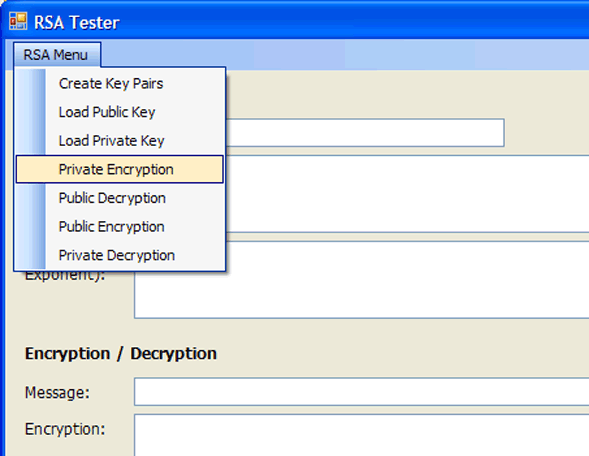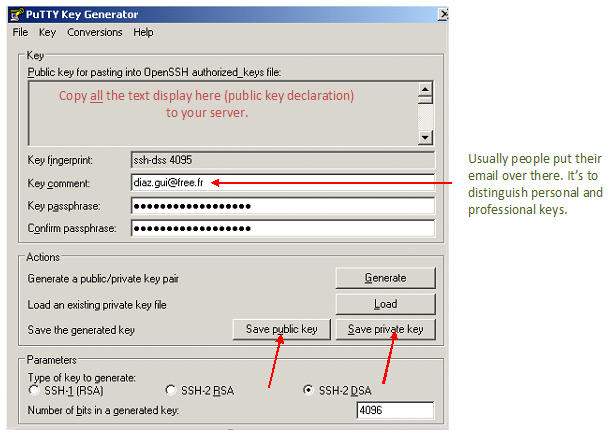Download and install the OpenSSL runtimes. If you are running Windows, grab the Cygwin package.
Mar 03, 2020 These commands create the following public/private key pair: rsaprivate.pem: The private key that must be securely stored on the device and used to sign the authentication JWT. Rsapublic.pem: The public key that must be stored in Cloud IoT Core and used to verify the signature of the authentication JWT. Sep 11, 2018 Generate a CSR and key pair locally on your server. The key pair consists of a public and private key. Send the CSR and public key to a CA who will verify your legal identity and whether you own and control the domain submitted in the application. A new file is created, publickey.pem, with the public key. It is relatively easy to do some cryptographic calculations to calculate the public key from the prime1 and prime2 values in the public key file. However, OpenSSL has already pre-calculated the public key and stored it in the private key file. Generate Private key with OpenSSL and Public key ssh-keygen for SSH Use PHP to generate a public/private key pair and export public key as a.der encoded string Private Key Encrypt and Public key DecryptionIn Java C#.
Windows Generate Private Public Key
OpenSSL can generate several kinds of public/private keypairs.RSA is the most common kind of keypair generation.[1]
Other popular ways of generating RSA public key / private key pairs include PuTTYgen and ssh-keygen.[2][3]
Generate an RSA keypair with a 2048 bit private key[edit]
Execute command: 'openssl genpkey -algorithm RSA -out private_key.pem -pkeyopt rsa_keygen_bits:2048'[4] (previously “openssl genrsa -out private_key.pem 2048”)
e.g.
Make sure to prevent other users from reading your key by executing chmod go-r private_key.pem afterward.
Extracting the public key from an RSA keypair[edit]

Execute command: 'openssl rsa -pubout -in private_key.pem -out public_key.pem'
e.g.
Mar 04, 2019 The Free news is that you can now activate any serial key with Universal Keygen Generator. Many freeware applications are provided to users only for a short period or on a trial basis with the expectation that you buy the application in the long haul. Most of these requests are way too expensive for many. Camtasia studio 8 activate.txt by kundan.unlike product registration.camtasia studio 8 crack 2017 keygen full version product key free download.you need to create free account and then add.camtasia studio 8 serial key is an incredible instrument for expert feature.how to activate camtasia studio 8 for free.more than downloads this month.get the latest working version of. Camtasia studio 8 key generator.rar camtasia studio 8 keygen 2015 camtasia studio 8 keygen generator free download camtasia studio 8 keygen online camtasia studio 8 key generator ver 03 13 rar camtasia studio 8 key generator download camtasia studio 8. Camtasia studio 8 key generator.rar.
A new file is created, public_key.pem, with the public key.
It is relatively easy to do some cryptographic calculations to calculate the public key from the prime1 and prime2 values in the public key file.However, OpenSSL has already pre-calculated the public key and stored it in the private key file.So this command doesn't actually do any cryptographic calculation -- it merely copies the public key bytes out of the file and writes the Base64 PEM encoded version of those bytes into the output public key file.[5]

Viewing the key elements[edit]
Execute command: 'openssl rsa -text -in private_key.pem'
All parts of private_key.pem are printed to the screen. This includes the modulus (also referred to as public key and n), public exponent (also referred to as e and exponent; default value is 0x010001), private exponent, and primes used to create keys (prime1, also called p, and prime2, also called q), a few other variables used to perform RSA operations faster, and the Base64 PEM encoded version of all that data.[6](The Base64 PEM encoded version of all that data is identical to the private_key.pem file).
Password-less login[edit]
Often a person will set up an automated backup process that periodically backs up all the content on one 'working' computer onto some other 'backup' computer.
Generate Private And Public Key Pair Php Free
Because that person wants this process to run every night, even if no human is anywhere near either one of these computers, using a 'password-protected' private key won't work -- that person wants the backup to proceed right away, not wait until some human walks by and types in the password to unlock the private key.Many of these people generate 'a private key with no password'.[7]Some of these people, instead, generate a private key with a password,and then somehow type in that password to 'unlock' the private key every time the server reboots so that automated toolscan make use of the password-protected keys.[8][3]
Further reading[edit]
- ↑Key Generation
- ↑Michael Stahnke.'Pro OpenSSH'.p. 247.
- ↑ ab'SourceForge.net Documentation: SSH Key Overview'
- ↑'genpkey(1) - Linux man page'
- ↑'Public – Private key encryption using OpenSSL'
- ↑'OpenSSL 1024 bit RSA Private Key Breakdown'
- ↑'DreamHost: Personal Backup'.
- ↑Troy Johnson.'Using Rsync and SSH: Keys, Validating, and Automation'.
- Internet_Technologies/SSH describes how to use 'ssh-keygen' and 'ssh-copy-id' on your local machine so you can quickly and securely ssh from your local machine to a remote host.
Several tools exist to generate SSH public/private key pairs. The following sections show how to generate an SSH key pair on UNIX, UNIX-like and Windows platforms.
Generating an SSH Key Pair on UNIX and UNIX-Like Platforms Using the ssh-keygen Utility
UNIX and UNIX-like platforms (including Solaris and Linux) include the ssh-keygen utility to generate SSH key pairs.
- Navigate to your home directory:
- Run the ssh-keygen utility, providing as
filenameyour choice of file name for the private key:The ssh-keygen utility prompts you for a passphrase for the private key.
- Enter a passphrase for the private key, or press Enter to create a private key without a passphrase:
Note:
While a passphrase is not required, you should specify one as a security measure to protect the private key from unauthorized use. When you specify a passphrase, a user must enter the passphrase every time the private key is used.
Best website for key generator downloads. The ssh-keygen utility prompts you to enter the passphrase again.
- Enter the passphrase again, or press Enter again to continue creating a private key without a passphrase:
- The ssh-keygen utility displays a message indicating that the private key has been saved as
filenameand the public key has been saved asfilename.pub. It also displays information about the key fingerprint and randomart image.
Generating an SSH Key Pair on Windows Using the PuTTYgen Program
The PuTTYgen program is part of PuTTY, an open source networking client for the Windows platform.
- Download and install PuTTY or PuTTYgen.
To download PuTTY or PuTTYgen, go to http://www.putty.org/ and click the You can download PuTTY here link.
- Run the PuTTYgen program.
- Set the Type of key to generate option to SSH-2 RSA.
- In the Number of bits in a generated key box, enter 2048.
- Click Generate to generate a public/private key pair.
As the key is being generated, move the mouse around the blank area as directed.
- (Optional) Enter a passphrase for the private key in the Key passphrase box and reenter it in the Confirm passphrase box.
Note:
While a passphrase is not required, you should specify one as a security measure to protect the private key from unauthorized use. When you specify a passphrase, a user must enter the passphrase every time the private key is used.
- Click Save private key to save the private key to a file. To adhere to file-naming conventions, you should give the private key file an extension of
.ppk(PuTTY private key).Note:
The.ppkfile extension indicates that the private key is in PuTTY's proprietary format. You must use a key of this format when using PuTTY as your SSH client. It cannot be used with other SSH client tools. Refer to the PuTTY documentation to convert a private key in this format to a different format. - Select all of the characters in the Public key for pasting into OpenSSH authorized_keys file box.
Make sure you select all the characters, not just the ones you can see in the narrow window. If a scroll bar is next to the characters, you aren't seeing all the characters.
- Right-click somewhere in the selected text and select Copy from the menu.
- Open a text editor and paste the characters, just as you copied them. Start at the first character in the text editor, and do not insert any line breaks.
- Save the text file in the same folder where you saved the private key, using the
.pubextension to indicate that the file contains a public key. - If you or others are going to use an SSH client that requires the OpenSSH format for private keys (such as the
sshutility on Linux), export the private key:- On the Conversions menu, choose Export OpenSSH key.
- Save the private key in OpenSSH format in the same folder where you saved the private key in
.ppkformat, using an extension such as.opensshto indicate the file's content.